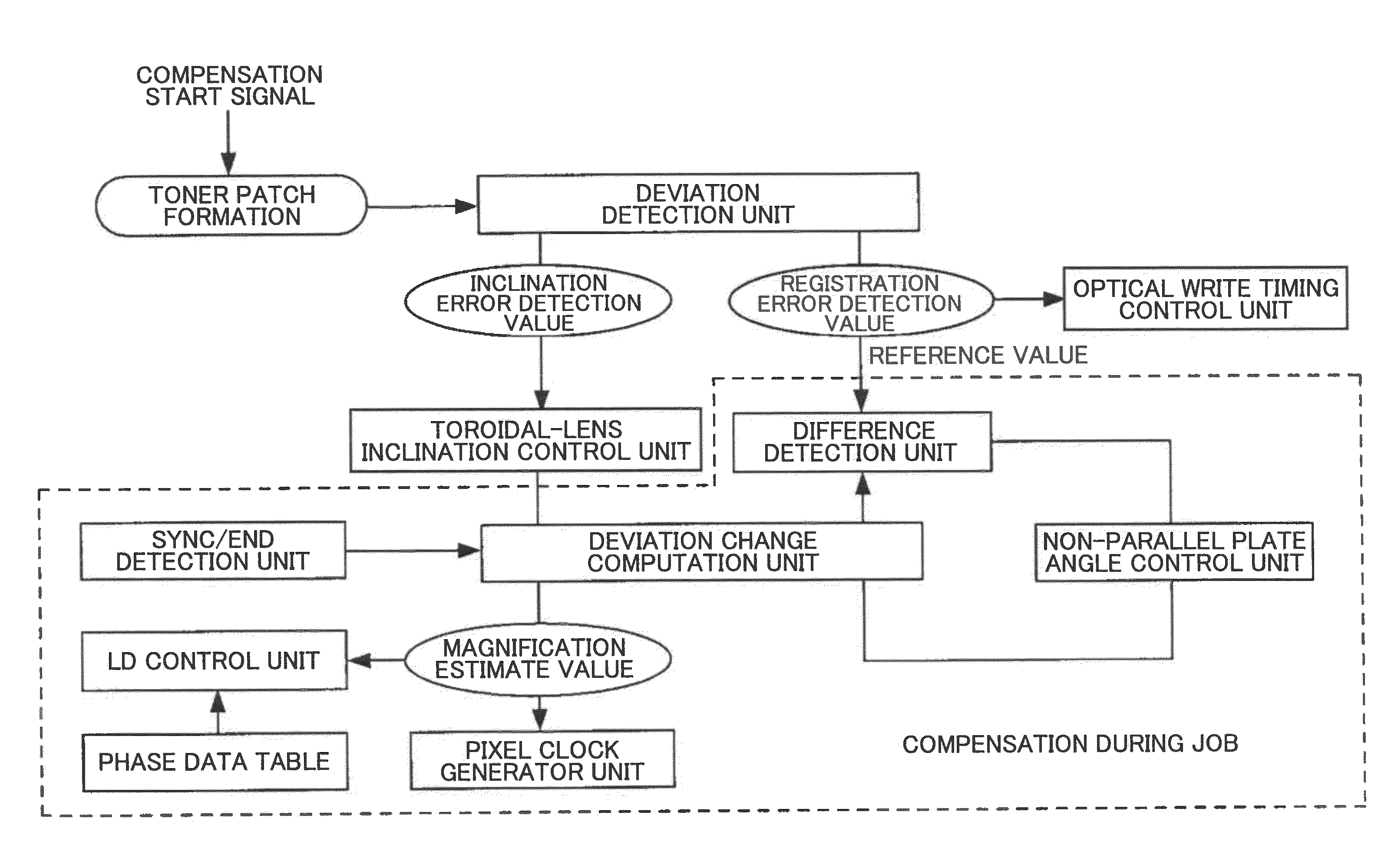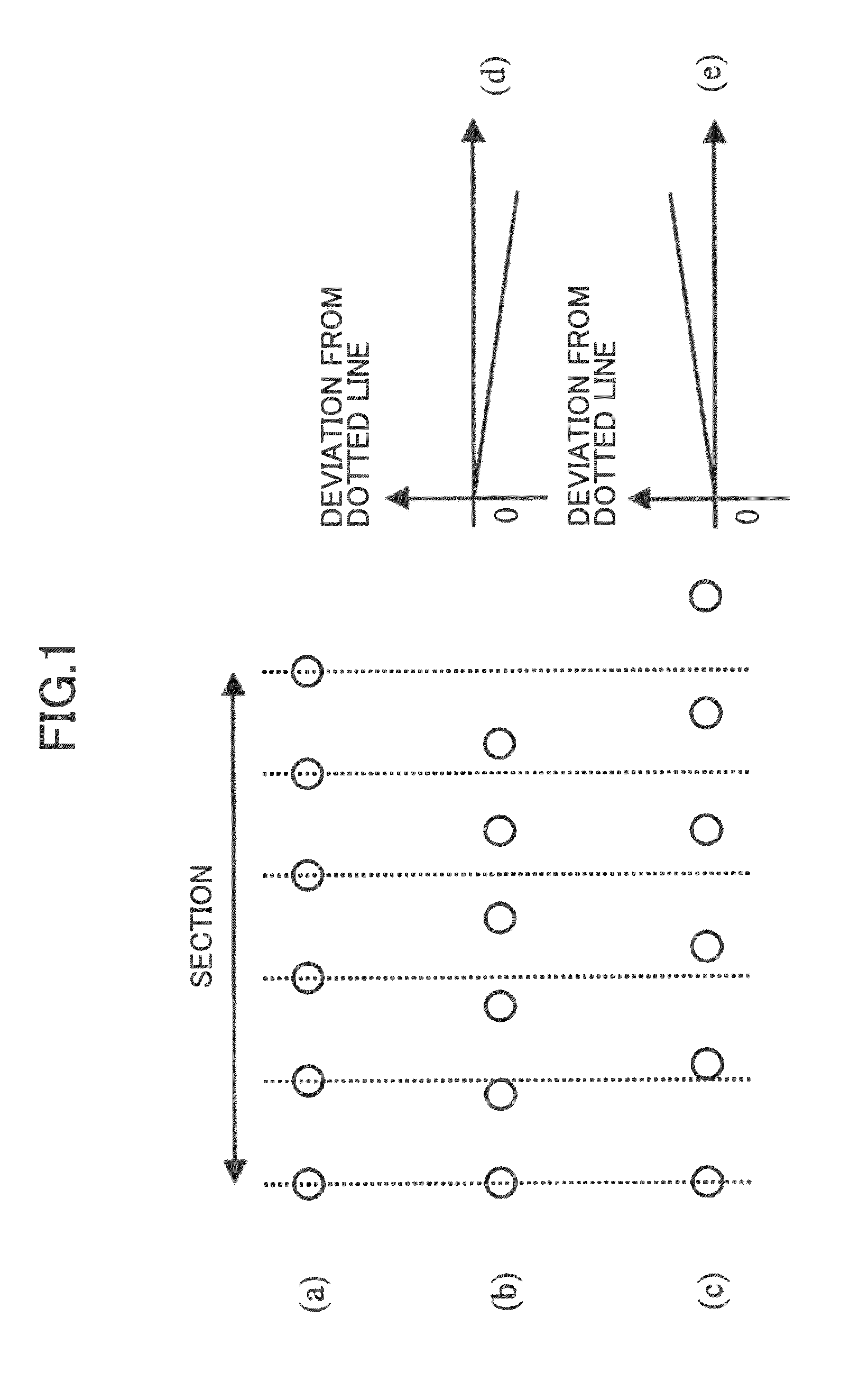Beam-spot position compensation method, optical scanning device, and multi-color image forming device
a compensation method and beam-spot position technology, applied in the field of beam-spot position compensation method for image forming device, can solve the problems of reducing the compensation speed of scanning using the f lens, affecting the image quality, so as to achieve good image quality and few color deviations.
- Summary
- Abstract
- Description
- Claims
- Application Information
AI Technical Summary
Benefits of technology
Problems solved by technology
Method used
Image
Examples
example 1
[0482]The curve 17A (before mirror rotation) shows the position error on the design by the scanning / focusing optical system in the optical scanner made as an experiment to FIG. 59.
[0483]This position error (position deviation from the ideal image quantity of the optical spot shown with the axis of ordinate) is the position error peculiar to the scanning / focusing optical system. The effective scanning region is ±150 mm, i.e., 300 mm, and the image quantity by the side of the optical scanning start is +. The inclination of the scanning line occurred in the initial state, and posture adjustment of the reflection mirror near the scanned surface is performed to compensate this.
[0484]As shown in FIG. 60A, the reflection mirror MR is counterclockwise rotated only for the 2.627 minutes around the rotation shaft AX by the side of the edge A by the side of the optical scanning start. The incident angle of the sub-scanning direction to the reflection mirror MR of the deflected light beam is th...
example 2
[0493]The optical scanner of the trial production is made to generate deflection of the scanning line, the mirror is incurvated by return deflection of this scanning line, and it compensated. The curve 19A (before mirror deflection) in FIG. 61 is the position error (before compensating the deflection of the scanning line) peculiar to the scanning / focusing optical system.
[0494]As shown in FIG. 62A and FIG. 62B, the center section B1 is pressed to the both ends A1 and C1 of Mirror MR by return, and bending is given. In the sub-scanning direction, the incident angle of the light beam to this reflection mirror MR is 17.65 degrees, as shown in FIG. 62B.
[0495]The surface of the reflection mirror MR is concave with a radius of curvature of 12 m by the curve. The amount of curves is −260 micrometers to 220 mm width of +110 mm to −110 mm of the effective scanning region. FIG. 66 shows the concrete numeric values similar to FIG. 64.
[0496]The position deviation before mirror deflection is indi...
example 3
[0499]In the Example 3, the scanning line which writes in, the color, for example, the black components image, of a certain reference, is made into the reference scanning line supposing the full color image formation, and the position error of the optical spot in the optical scanner is compensated by making the position error of the optical spot in this reference scanning line into the reference position error.
[0500]After an appropriate time, rotation of the mirror compensated the inclination of the scanning line by return, and the position error of the main scanning direction of the optical spot originated and generated in this compensation is compensated again.
[0501]The reflection mirror is the thing of the 34.5 incident angles like what is shown in FIG. 60 A-FIG. 60C.
[0502]This is counterclockwise rotated around the revolving shaft AX for the 3 minutes, 297-micrometer variation rate is carried out by the optical scanning termination side to the effective scanning region with 300 ...
PUM
 Login to View More
Login to View More Abstract
Description
Claims
Application Information
 Login to View More
Login to View More - R&D
- Intellectual Property
- Life Sciences
- Materials
- Tech Scout
- Unparalleled Data Quality
- Higher Quality Content
- 60% Fewer Hallucinations
Browse by: Latest US Patents, China's latest patents, Technical Efficacy Thesaurus, Application Domain, Technology Topic, Popular Technical Reports.
© 2025 PatSnap. All rights reserved.Legal|Privacy policy|Modern Slavery Act Transparency Statement|Sitemap|About US| Contact US: help@patsnap.com



